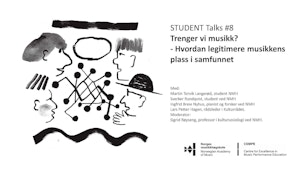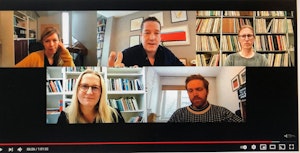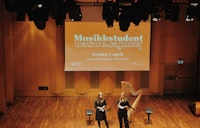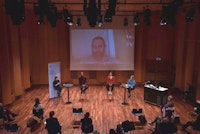The process of legitimising music can be divided into two categories. Either we argue for music on account of its inherent value (music as a goal) or its extra-musical impact (music as a means). Occasionally we read articles about how music can make school children better at maths, how it can build communities and improve integration, and how it can boost mental health. In the eyes of composition student Martin Langerød, however, it is important that we do not base the value of music on such extra-musical by-products.
- The discussion should instead be motivated by the intrinsic value of the arts. That’s what we need to do in order to be taken seriously. We do ourselves a disservice if we go with these more simplistic explanations of why music is of value, because we are then talking down the inherent value of music.
Arts and music must be free, according to Langerød, and an art that creates its value on the basis of instrumental, extra-musical functions is no longer free.
Legitimising the musician
Closely linked to the discussion about why we need music is the debate about why we need musicians. And what do musicians need in order to make a living from practising and performing music?
Ingfrid Breie Nyhus, herself a pianist and composer, believes that musicians need to become politically engaged.
- This is about strengthening the rights of self-employed people, expanding grants schemes for music and musicians, and challenging people’s expectation that music should be without costs.
We are seeing how other European countries’ funding for orchestras, music services and musicians is being gradually eroded. This is a reminder that existing funding schemes should not be taken for granted.
- In the past we spent a lot of money on music, but now we can listen to practically every single piece ever written for 100 kroner a month. It’s robbery! We are giving away our product, and it instils an attitude that music should be more or less free, according to Nyhus.
There is growing resistance against the streaming platforms in many parts of the world, and music students who will be making a living from music should make this a campaigning issue. Nyhus believes that we can work at multiple levels and not least help bring about a change in attitudes amongst friends and family that making music costs money, and that experiencing music should therefore also have a prize.
- Another increasingly pressing issue is the low fees paid to musicians, Nyhus argues. While most people see a real wage increase every year, little or nothing is happening to musicians’ fees.
The situation has become especially acute during the coronavirus pandemic in that grants schemes are based on last year’s income. A letter published in the VG newspaper on 23 February this year and signed by 350 Norwegian musicians paints an accurate picture of what it is like to start out as a young musician, where many engagements in the early days are badly paid or where the promoter only covers expenses and the musicians are expected to pay for free.
It is a complex problem, because the organisers are sometimes unable to pay more.
- Perhaps the Arts Council could create a bonus scheme for festivals that pay musicians a decent fee? Ingfrid suggests.
Although there are many battles to be fought, it is important that music students do not lose faith and continue to believe that it is possible to make a living from music:





